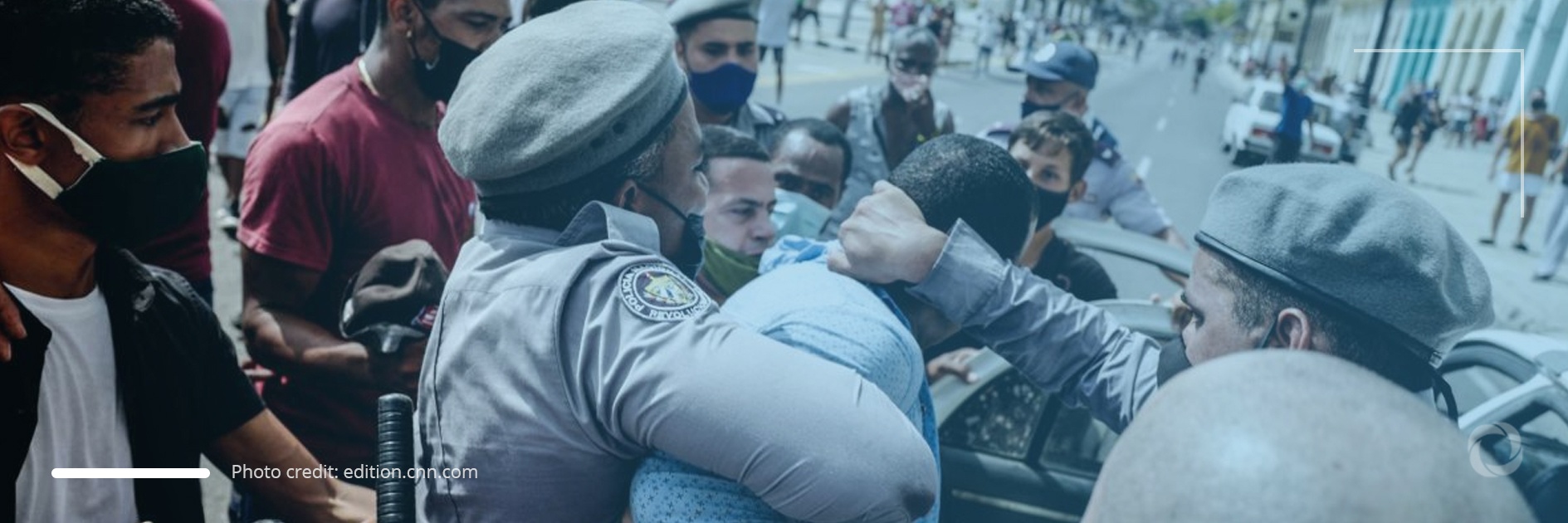As Cuba is experiencing its worst economic crisis since 1991, thousands of people have taken to the streets in anti-governmental protests that have been spreading throughout the country since 11 July.
The protesters are expressing their discontent about the scarcity of medicines, energy blackouts, and food shortages which have forced Cubans to queue for hours to obtain food.
“The people are dying of hunger! Our children are dying of hunger,” one of the protesters was heard to shout during a rally in the province of Artemisa.
“It is the most massive popular demonstration to protest against the government that we have experienced in Cuba since ’59,” Carolina Barrero, a Cuban activist, told The New York Times.
The demonstrations turned into violent clashes with the security forces when the latter cracked down on protesters using pepper spray and batons. A video posted on social media shows protesters overturning a police car in Cardenas and people looting government-run stores that were selling overpriced products in foreign currencies.
Massive protests in #Cuba are a desperate cry to @DiazCanelB’s government, which does not listen. Instead of repressing the courageous people protesting, his government has the obligation to address their social and human rights demands pic.twitter.com/C2i39xck6P
— Erika Guevara-Rosas (@ErikaGuevaraR) July 13, 2021
“During yesterday’s [11 July] spontaneous demonstrations which spread across different areas of the country, Amnesty International received with alarm reports of internet blackouts, arbitrary arrests, excessive use of force – including police firing on demonstrators – and reports that there is a long list of missing persons,” said Erika Guevara-Rosas, America’s director at Amnesty International.
Some protesters openly demanded the authorities, led by President Miguel Diaz-Canel, to step down. In the capital of Havana, crowds shouted, “Down with the dictatorship.”
Instead of trying to calm the protesters down, President Diaz-Canel called on his supporters to take to the streets and oppose the protesters.
“We call all revolutionaries to hit the streets to defend the revolution everywhere,” he said in a TV address, blaming the U.S. for the ongoing riots.
The main triggers of the protests are hunger and the dire economic situation. In 2020 the Cuban economy shrank by 11%, the deepest fall since 1991. The situation has been worsened by the global pandemic which has kept tourists away, thus depriving the country of its main source of external revenue.
According to the Cuban Observatory of Human Rights, 21% of Cuban families lived on less than US$20 per month in October 2020, a figure twice that recorded in January 2020 when 24% had US$20-40 dollars per month and 19% between US$41 to 100. In summary, about 64% of Cubans are living on less than US$1.11 dollars daily.
Meanwhile, against this background, Cubans have been observed migrating increasingly more towards U.S. shores. Since October 2020, the U.S. Coast Guard has apprehended over 512 Cubans in the sea while in 2019 their number was 49. On 11 July, nine Cuban migrants who were nearing the U.S. coastline went missing when their boat overturned close to Key West, Florida.

